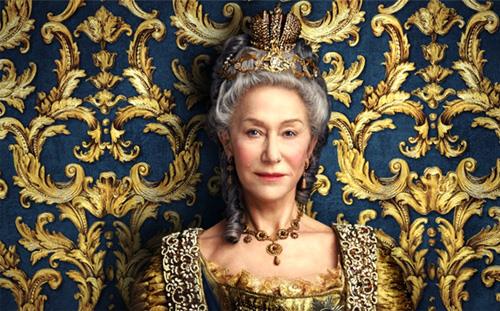
It's disconcerting and almost painful to say that a lavish historical miniseries starring Helen Mirren is a bit disappointing.
But Catherine The Great, a four-part drama that launches Monday at 10 p.m. ET on HBO, has neither the sparkle nor the richness that the cast and subject matter might lead the viewer to expect.
Mirren's Catherine isn't especially pleasant, which is doubtless true to history. She began her reign as empress of Russia in 1762 by orchestrating a coup that overthrew her husband, Peter III, and the fact she ruled until her death in 1796 correctly suggests she played to win, not to become Miss Congeniality.
This makes Mirren's Catherine interesting in a variety of ways. It just never makes us like her very much, which becomes an issue because, frankly, we don't end up liking much of anybody here.
Catherine's primary partner, in several senses of the term, is Grigory Potemkin (Jason Clarke), a crafty and amoral scoundrel who also happens to be a brilliant military commander.
Since consolidating power through military means was essential to Catherine's long-term plans, she gravitates to Potemkin early in the game. His personal excesses, revolting to some of the palace staff, don't concern her. In several areas, she would rather join his game than judge it.
Potemkin is, however, only one of many characters Catherine must deal with and manipulate as she strengthens the shaky base on which she first ascended the throne. She does this brilliantly, eventually becoming what many historians call the most powerful and successful female ruler ever.
It helps her that while every one of the people around her professes undying, life-sacrificing loyalty to Mother Russia, their real agendas most often involve maneuvering themselves into favored positions. It's not hard to understand why they do this since those in unfavored positions can be subject to consequences like a beheading.
Catherine is not the sentimental type, either by nature or by strategy. From the start, she understands that being respected and feared works a lot better than trying to be loved.
Catherine the Great inevitably spends considerable time on the consequences of Catherine's reign, which were profound and almost entirely positive for Russia. She elevated her previously provincial country to a position of world respect and power, setting in motion, geopolitical forces we're still feeling today.
Much as one hates to say it in any show that stars Helen Mirren, this one could at times have benefited from slightly less focus on the personal life of its central character.
That might also have lessened one of the show's other major problems, which is that many of us Western viewers will get lost in the maze of characters and mini-dramas. Russian history scholars will presumably have little trouble, but the rest of us will find ourselves frequently thinking, "Wait, who is that again? What are their connections to the oligarchy? Why is she out of favor now?"
Catherine the Great does deliver on visual expectations. The palace scenes are lush and lovely, a riveting look at money in action, and the Russian countryside could not seem more appealing.
Yet this beauty, in a way, works against some of the writing. Many of the characters, and at times Catherine herself, come across as coarse and vulgar. While all historical dramas need not be sandpapered down and polished into Downton Abbey, there's a certain implicit elegance and style to royalty.
Historical dramas tend to be more appealing when they acknowledge that. While the coarse part may be historically accurate, it can also be jarring and distracting.
The best historical dramas immerse viewers in an alluring other world. Catherine the Great doesn't quite get there.